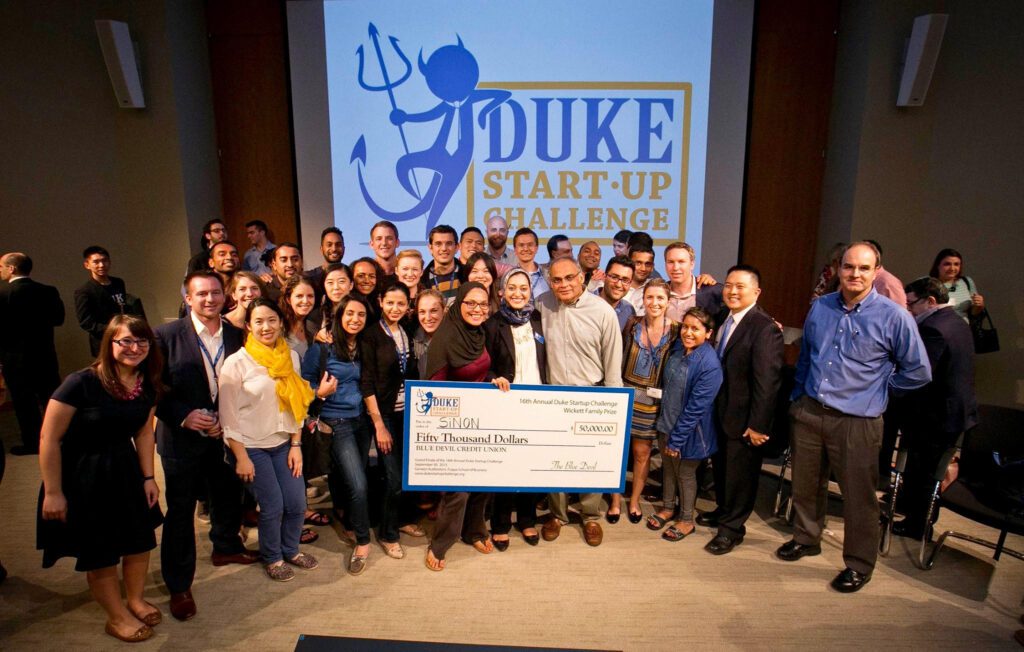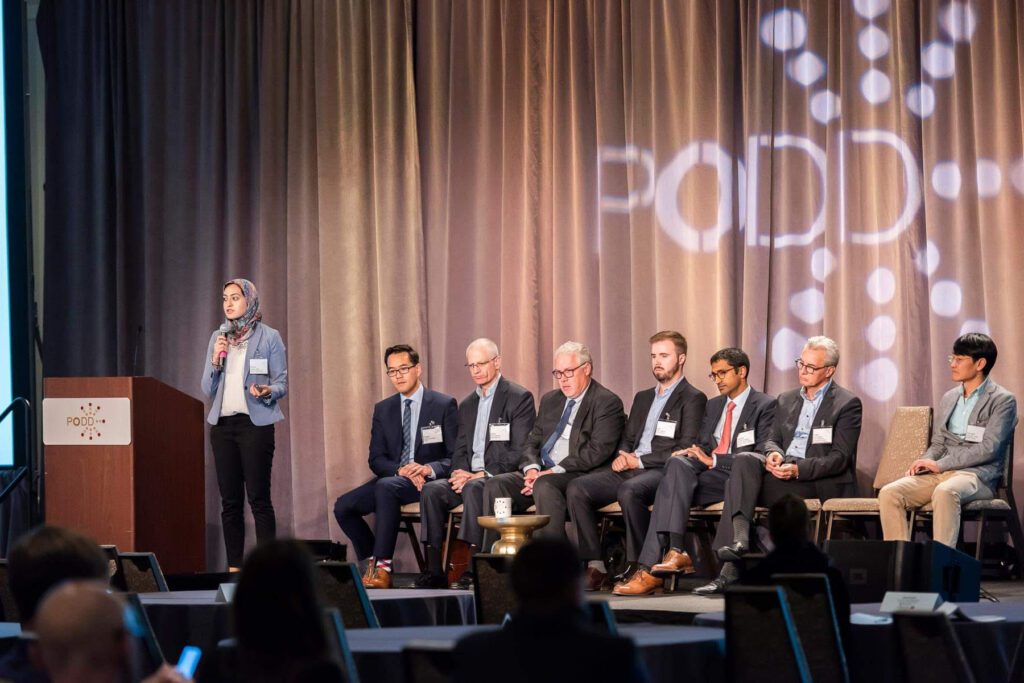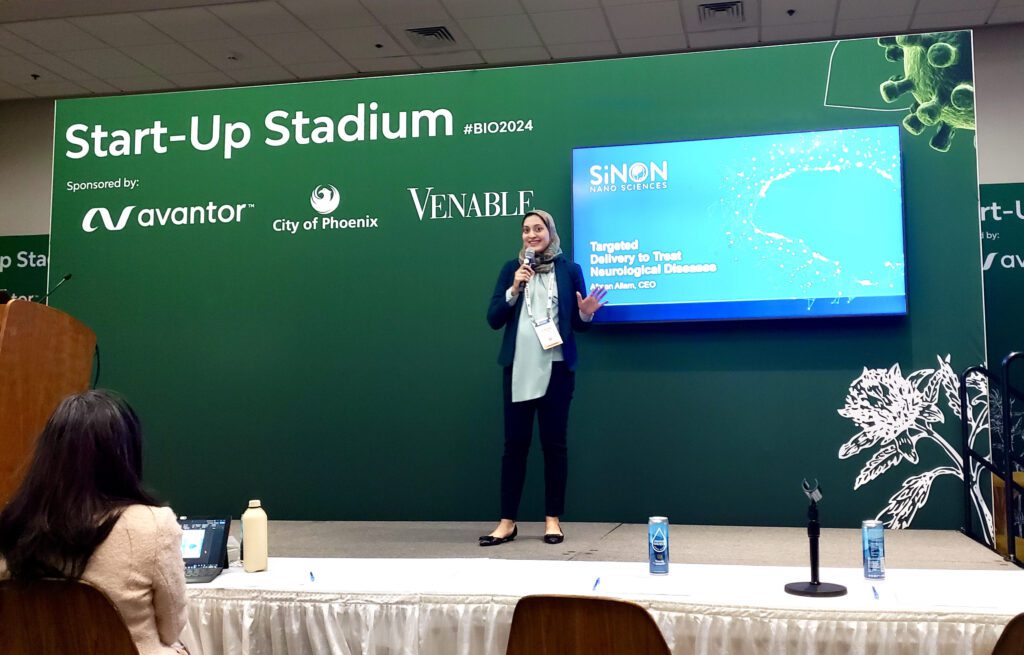Afreen Allam’s company, SiNON Nano Sciences, has been working tirelessly to overcome one of the most significant challenges in neurology: enabling drugs to cross the blood-brain barrier using advanced nanoparticle technology.
This selective, semi-permeable membrane serves as the brain’s gatekeeper, preventing harmful substances from entering while posing a formidable obstacle to targeted drug delivery. SiNON is striving to develop groundbreaking solutions to this problem, which remains one of the last great hurdles in neurological medicine.
SiNON’s innovative approach earned Allam the top prize in the Seed-Stage Category in the Start-Up Stadium at the 2024 BIO International Convention in San Diego, hosted by the Biotechnology Innovation Organization (BIO).
Bio.News talked with Allam about how she got started in biotech, why the blood-brain barrier is so challenging, and how diverse voices and perspectives in biotech are not only leading the way in unique innovative technology, but also helping the industry evolve.
A predestined path to medicine

Allam admits she wasn’t given much of a choice when it came to her career path. “I grew up in a very typical Asian household where medical school was the only option,” she explains. “At a young age, it’s ingrained in you that you are going to med school, so you better figure out how to get there.”
She started her journey by volunteering at the Duke Cancer Center, a position she thought she might quit, but where she ultimately stayed for seven years. “I really formed a bond with the patients and got to understand the true pain points of traditional chemo,” she says.
“It got me thinking there has to be a better way to do this,” recalls Allam. “Why are we spreading a high dose of toxins throughout the body, hoping that it eventually gets to the target site?”
Allam took this question to North Carolina State University, where she double majored in microbiology and biochemistry. During a study abroad, Allam started to find an answer to her question through her research on carbon nanotubes at the chemistry department at Kanpur Indian Institute of Technology. Her father pushed her to patent her technology—laying the groundwork for what would eventually become SiNON Nano Sciences.
As Allam neared graduation, she faced a pivotal decision. “I realized that while I loved medicine, I felt that research could potentially make a broader impact,” she says. This led her to Duke University’s business school—and Duke’s Startup Challenge, which awards $50,000 to the winner. Although she was advised not to bother applying since no biotech or science-based company had ever won, Allam pressed on.
“On the day of our pitch, the venture capitalist writing the $50,000 check said, ‘I only invest in tech companies. I don’t believe in biotech because it takes too long to get off the ground.’” Allam remembers feeling her chances slipping away, but decided to present as if she hadn’t heard the discouraging words.
SiNON won.
After graduation, Allam continued to grow her company and expand her work. While the COVID-19 pandemic threatened SiNON’s early momentum, Allam’s network provided crucial support. A classmate reached out, offering to invest, followed by a similar offer from an alumni mentor. SiNON quickly raised $169,000, surpassing their initial goal, allowing them to fund studies on tight junction proteins in the blood-brain barrier, yielding positive results.

The challenge of the blood-brain barrier
The blood-brain barrier, while essential for protecting the brain, poses a significant challenge in treating neurological diseases such as brain tumors, Alzheimer’s, Parkinson’s, and ADHD. The barrier allows only 2% of molecules to pass through, making effective drug delivery exceedingly difficult. SiNON’s mission, as hinted by the company’s name, is reminiscent of the Trojan Horse strategy—using carbon nanoparticles to stealthily deliver medicine across this formidable barrier.
“This barrier is beneficial when we’re healthy,” Allam explains. “But for patients with neurological conditions, we need medications to cross it effectively without harming the rest of the body.”
SiNON is currently focused on demonstrating the efficacy of its technology, having already established safety and toxin clearance patterns. However, securing funding for these expensive studies remains a challenge, particularly in a volatile market where investors demand efficacy data that requires significant capital to produce.
SiNON’s carbon-based solution
“We developed a carbon-based solution,” Allam explains, “because it’s a fundamental building block of life and is naturally present in our bodies, making it a safe compound.”
This is in comparison to other technologies that typically use metal-based cores with bio-friendly wrappers to transport drugs to a localized site. “But these wrappers often break down during animal and human testing,” says Allam, “leaving metal particles that end up in the kidneys and liver. This is harmful and undesirable. So, we focused on producing something safe for both animal and human use.” Essentially, SiNON wants their soldiers to be made of the right stuff so that there are no complications in the midst of trying to cure disease.
“The second aspect,” continues Allam, “was how do we make sure it actually gets out of the system? And so we have a clearance pattern of around day six, where it gets filtered out through the kidneys, and basically comes out through the urine,” which ensures it doesn’t stay in the body and produce adverse side effects.
SiNON’s goal is to develop localized delivery of drugs using safe materials without opening up the blood-brain barrier in the process. To do so, SiNON uses a simple IV drug delivery mechanism that can be administered as an outpatient procedure. “Most oncology patients already receive IV therapy, so this method wouldn’t change the mode of treatment but would make it safer.”
This would allow SiNON to not only target tumor cells, but also give higher doses of a drug, or only the amount of dose needed to treat the tumor, versus having the medicine going everywhere else in the body. As a result, toxicity comes down. When that happens, side effects come down.
But SiNON is still figuring out the particulars, such as finding the right-sized nanoparticle. In the early days, SiNON started off with carbon nanotubes, which were too big; then, they went into carbon dots, which were too small; and then went to carbon nanoparticles, which seem to be the Goldilocks ratio that they have been looking for.
“We had to come up with the optimal size range—one that can carry enough of the drug but would also not just be kicked out of the system before it can actually do its job,” explains Allam. “We’ve now come to carbon nanoparticles, which are about 80 to 100 nanometers in size, spherical, which allows us to have a greater surface area to attach things to the surface, but also carry a high enough payload to actually be effective.”
SiNON seems to be in a pretty good place. But as Allam explains, her work extends beyond the lab—including fighting to maintain her well-deserved seat at the table.

Addressing the diversity gap in biotech
Beyond the lab, Allam has faced the challenges of being a minority in multiple ways: as a woman, as someone without a Ph.D., and as a person of color. During her first pitch, she noticed the audience’s disinterest and questioned her ability to succeed. “I almost felt like giving up,” she admits. “But I knew I had to break this barrier somehow. Just because I don’t have a Ph.D. doesn’t mean I don’t understand the field.”
Even today, Allam is questioned about her ability to lead SiNON, especially as she navigates pregnancy while running the company. “I’m like, I am running the company; this isn’t my first time doing this,” she asserts.
Despite these challenges, Allam sees progress. “I remember attending a conference where there was actually a line for the women’s bathroom—a rarity in this industry,” she recalls with a smile.
Allam is committed to supporting other women and people of color in biotech, recognizing the importance of mentorship. “When I was starting out, I didn’t have a mentor to guide me. I encountered two types of women in biotech: those who believed others should suffer as they did, and those who wanted to help because they knew the struggles. I believe the latter mindset is crucial for the advancement of women in this industry. “
Allam concluded with words of encouragement: “You’re going to hear a lot of nos, but our job is to push through that and believe in the technology, believe in the science, and really focus on why you got started and why you are doing what you’re doing.”




